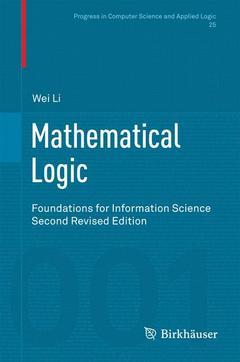Mathematical Logic (2° Éd., 2nd ed. 2014) Foundations for Information Science Coll. Progress in Computer Science and Applied Logic, Vol. 25
Auteur : Li Wei

Mathematical logic is a branch of mathematics that takes axiom systems and mathematical proofs as its objects of study. This book shows how it can also provide a foundation for the development of information science and technology. The first five chapters systematically present the core topics of classical mathematical logic, including the syntax and models of first-order languages, formal inference systems, computability and representability, and Gödel?s theorems. The last five chapters present extensions and developments of classical mathematical logic, particularly the concepts of version sequences of formal theories and their limits, the system of revision calculus, proschemes (formal descriptions of proof methods and strategies) and their properties, and the theory of inductive inference. All of these themes contribute to a formal theory of axiomatization and its application to the process of developing information technology and scientific theories. The book also describes the paradigm of three kinds of language environments for theories and it presents the basic properties required of a meta-language environment. Finally, the book brings these themes together by describing a workflow for scientific research in the information era in which formal methods, interactive software and human invention are all used to their advantage.
The second edition of the book includes major revisions on the proof of the completeness theorem of the Gentzen system and new contents on the logic of scientific discovery, R-calculus without cut, and the operational semantics of program debugging.
This book represents a valuable reference for graduate and undergraduate students and researchers in mathematics, information science and technology, and other relevant areas of natural sciences. Its first five chapters serve as an undergraduate text in mathematical logic and the last five chapters are addressed to graduate students in relevant disciplines.
A research monograph with a textbook style, well-structured and providing concrete illustrative examples as well as formal proofs for all theoretical results
New ideas and methodologies from information science and technology are used to annotate the concepts and theorems of mathematical logic
Provides a new angle of view for mathematicians and a friendly environment for information scientists to understand the quintessence of mathematical logic
The author's original work on version sequences, revision calculus, and language environments is coherently integrated into the book
Date de parution : 11-2014
Ouvrage de 301 p.
15.5x23.5 cm



